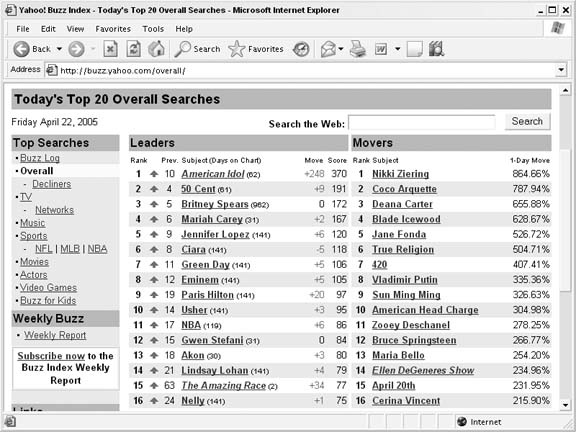Find out which pop culture phenomenon is on the way in or out by looking at trends in search queries.
Everywhere we look in the media, there are lists of bestsellers that can tell us what’s hot at the moment. People watch the top-grossing movies like they’d watch the stock market, and best-selling books are always a topic of conversation. Yahoo! has its own way of tracking what’s hot: by looking at the most common phrases people search for. If Yahoo! users are suddenly searching for singer Gwen Stefani more often than for Britney Spears, that shows a shift in interest or popularity.
Yahoo! tracks exactly these kinds of trends at the Yahoo! Buzz Index (http://buzz.yahoo.com). When you browse the Buzz Index, you’ll find several Top Movers Charts, separated into categories such as TV, Music, Sports, Movies, Actors, Video Games, and overall queries. Each chart has the top 15 search queries with the greatest percentage increase for that particular day. These charts are a quick snapshot of which queries are gaining the most ground.
At the bottom of each chart, you’ll find a “View complete chart…” link, which you can click to compare the top Movers with the Leaders. Instead of tracking the greatest change in terms of percentage, the Leaders chart shows you the top search queries for that category. Figure 1-45 shows the Leaders and Movers lists, side by side. The current champs (Leaders) are on the left, and the challengers (Movers) are on the right.
Each entry on the Leaders chart shows the rank, whether the term is gaining or losing ground, how many points the term has moved in the last day, the number of days the term has been on the chart, and the overall
buzz score. According to Yahoo!, a single buzz point is what 0.001% of Yahoo! users were searching for on a particular day. So the buzz score of 370 for the top entry in Figure 1-45 means that 0.37% of all Yahoo! users searched for American Idol on that day. With millions of users, that small percentage means thousands of people.
From the left side of the page, you can click the Decliners link under Overall to list terms that have dropped over the last day. Many of the entries are related to news stories that were on top of people’s minds the previous week.
The terms are placed into categories like TV, Music, and Sports by Yahoo! Buzz Index editors, and general terms like television or football are filtered out of the results. The editors also exclude terms that aren’t appropriate for children.
If you don’t plan on visiting the Yahoo! Buzz Index every day to see the movers and shakers, you might want to subscribe to the Buzz Index Weekly Report by browsing to http://subscribe.yahoo.com/subscribe?.optin=ybz&.src=ybz. Once subscribed, you’ll receive an email every Sunday with the hottest search trends from the previous week. The report is compiled by Yahoo! editors and sometimes contains a slice of reporting that doesn’t show up on the leader boards. For example, the April 3, 2005, report included a look at the most popular diet searches and found that Weight Watchers was beating out South Beach Diet and Atkins Diet, even though these terms weren’t high enough to be in the overall search. You can also stay on top of the Yahoo! Buzz Log—a frequently updated look at what’s hot by Yahoo! Editors—by subscribing to the Buzz Log RSS feed (http://buzz.yahoo.com/feeds/buzzlog.xml) in your favorite newsreader.
If you’re interested in what was popular at some point in the past, you can take a stroll through the Yahoo! Buzz Log archives. At the time of this writing, Yahoo!’s archives go back to June 20, 2004. To find the page, enter this search query at http://search.yahoo.com:
site:buzz.yahoo.com "June 20, 2004"
The Yahoo! Buzz Log archives are based on Sundays, so you can change the date to any Sunday you’d like to see between June 20, 2004, and the present.
Tip
Your Yahoo! Calendar at http://calendar.yahoo.com in monthly view works well for finding any given Sunday.
So if you’d like to find out what was on people’s minds in mid July of 2004, you could search like this:
site:buzz.yahoo.com "July 11, 2004"
Or you could create the archive URL yourself in this format:
http://buzz.yahoo.com/buzz_log/yyyymmdd/So the URL for the Buzz Log archive for July 11, 2004, would be:
http://buzz.yahoo.com/buzz_log/20040711/
Unfortunately, Yahoo! doesn’t provide access to past charts, but you can get the Yahoo! Editors’ takes on what was happening by visiting these archives.
Get Yahoo! Hacks now with the O’Reilly learning platform.
O’Reilly members experience books, live events, courses curated by job role, and more from O’Reilly and nearly 200 top publishers.


